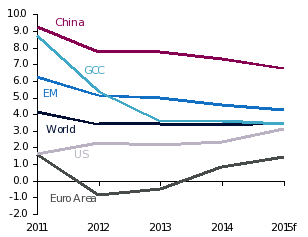In its recently-published World Economic Outlook, the International Monetary Fund (IMF) expects global growth to pick up only marginally in 2015 to 3.5% from an estimated 3.4% in 2014. Global growth is expected to be driven by emerging markets (EMs), which are projected to grow by 4.3% in 2015. Meanwhile, advanced economies are forecast to grow by only 2.4% as the shadows of past crises continue to cloud the outlook. Although growth is expected to be around 3.5%, the picture varies by region and country
The world economy has recently been dominated by two factors. First, the sharp decline in oil prices, which have nearly halved since mid-2014. The fall in oil prices was mostly a result of a supply shock. Shale oil in the United States added 1.4m barrels per day (b/d) in 2014, which was much more than expected. In addition, OPEC decided to maintain its production at 30m b/d when some market participants expected a cut from the group to rebalance the market.
Second, large movements in exchange rates. Among the advanced economies, the euro and the yen have witnessed major depreciations while the US dollar has appreciated strongly. In EMs, currencies which are linked to the US dollar, such as the Chinese Renminbi have also appreciated against other currencies. The sharp exchange rate movements have been driven by divergent monetary policies around the world. While the US Federal Reserve (Fed) is expected to raise interest rates later this year, the Euro Area and Japan are engaged in large quantitative easing programmes. Along with low oil prices and falling inflation, loose monetary policy in the Euro Area and Japan has pushed more than two dozen central banks around the world to lower interest rates in recent weeks.
IMF Growth Forecasts
(%)
Sources: IMF and QNB Group analysis
The movements in oil prices and exchange rates have important distributional implications. Lower oil prices shift income from oil-exporting countries to oil-importing ones. Exchange rate movements tend to shift growth from countries with appreciating currencies to those with depreciating currencies. The distributional implications of the two forces are likely to dominate the global picture, creating winners and losers in the world economy.
The US is losing competitiveness from the large appreciation of the US dollar. Since June 2014, the broad real dollar index has gone up by 11.5%, hurting US exports and corporate profits. On the other hand, lower oil prices are expected to benefit the US economy by increasing the income available to consumers to spend on non-oil items. The US economy is also likely to benefit from the strong performance of its labour market (see our commentary dated 12 April 2015). As a result, the IMF expects US growth to reach 3.1% in 2015, compared to 2.4% in 2014.
The Euro Area is possibly the largest beneficiary from the distributional effects of lower oil prices and exchange rate movements. The region is an energy importer and has therefore seen real incomes being boosted by lower oil prices. Furthermore, the euro has depreciated by around 23.0% since March 2014, benefiting the region’s exports. However, the risk of deflation is still high (the IMF estimates the probability of persistent deflation in the Euro Area to be around 25%) and the region is still recovering from the legacy of its sovereign debt crisis of 2012. Overall, the IMF expects growth in the Euro Area to accelerate but to remain weak at 1.5% in 2015.
Lower oil prices are also likely to benefit China. But the renminbi, which is managed to remain stable against the US dollar, has appreciated against most global currencies, which is hurting Chinese exports. In addition, the Chinese economy is slowing down as the authorities attempt to change its growth model from an economy driven by investment to one led by consumption. We expect growth to slow to stabilise around 7.0% in 2015 (from 7.4% in 2014) in line with the government’s target (see our QNB China Economic Insight 2015 report). The slowdown in the Chinese economy and soft commodity prices are having adverse effects on other EMs, especially Brazil and Russia.
The GCC is likely to be insulated from the fall in oil prices for three reasons. First, most governments have made significant savings during the last oil boom. Second, in some GCC countries, like Qatar and the UAE, growth is mainly driven by large investments in the non-hydrocarbon sector. Third, GCC countries have low levels of public debt, which allow them to borrow cheaply to finance any short-term deficits in their budgets. As a result, the GCC is expected to grow by 3.4% in 2015 despite lower oil prices.
